Racism
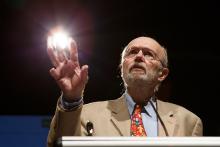
I knew that the problem of race in America was one of the two main engines that mobilized his project in Christian ethics. The other was the threat of war. In the 1980s, Glen put together a method of doing Christian ethics in the context of the Cold War that was meant to help foster clarity in conversation and allow unspoken influential preferences to be recognized. As he understood it, we are much more than reasoning, rational minds; we are a complex amalgam of different contributing factors, including our core convictions, community loyalties, things we are passionate about, people we trust, and political commitments. Indeed, many things are at play in all of our ethical decisions.

The color of your skin shouldn’t determine whether you live or die. But that is precisely the case for Duane Buck, a Texas man facing execution. His case is before the Supreme Court this month.

A year ago, when the death of Freddie Gray and resulting unrest in Baltimore filled the news, the Rev. Kathy Dwyer felt she had to do something.
“Every time I turned on the TV, I just felt like I was getting punched in the gut from watching the issue of racism just escalate in our country,” said the white pastor of a predominantly white United Church of Christ congregation in Arlington, Va.
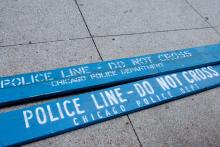
A task force appointed by Chicago Mayor Rahm Emanuel has unleashed a blistering account of racism in the Windy City’s police department, reports The New York Times. The report was issued April 13, just as the police department’s new superintendent was being installed.
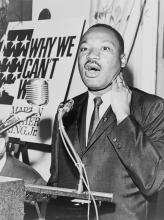
April 4, 2018 — two years from now — will be the 50th anniversary of the death of Dr. Martin Luther King Jr.
April 4, 2017 — one year from now — will be the 50th anniversary of his speech to Clergy and Laity Concerned About Vietnam, at Riverside Church in New York. There he warned us of the “deadly triplets” of racism, militarism, and materialism that were endangering America. (And still are.)

Although King should rightly be lifted up as a hero of nonviolence and deeply Christian minister, we need to be reminded of King's radical legacy. King harshly criticized white people who failed to support black leadership. And particuarly toward the end of his life, King began to speak out about economic injustice and militarism, decrying the ills of capitalism and the Vietnam War.
As you remember today a leader who was murdered for his political beliefs, take a moment to reflect on these nine quotes:
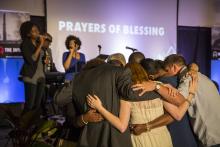
Imagine what it would look like for a diverse mosaic of justice movements to stand together to oppose white supremacy.
Imagine what it would look like for our spirituality to be infused with a longing for repair and restoration of what centuries of racial division have broken.
Imagine what it would look like for a room full of business leaders, local pastors, grassroots organizers, and artists to discuss real answers to deep problems.
That’s the vision for The Summit 2016. And we need your help to make it happen.

Jim Wallis, social activist, author and one of America’s most influential Christian voices discusses social justice and the Christian life.
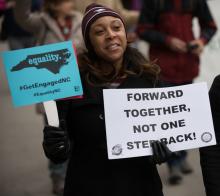
Meeting for a one-day emergency session last week, North Carolina’s General Assembly passed HB2, which has been widely criticized as the nation’s worst anti-LGBT bill. In supposed defense of the general welfare, conservative lawmakers moved to stop a Charlotte ordinance that would have allowed transgender citizens to use public restrooms of the gender with which they identify. But their call to “protect our women and children” echoes language of the white supremacy campaign that overthrew local governments in this state 120 years ago. Both then and now, the call to defend families against imagined predators is a crude power grab.
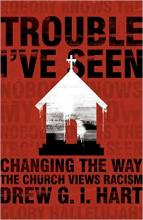
Since the beginning of the modern era almost 500 years ago, Western culture has been marked by a distinct aversion to history. Thus we have come to narrate our lives primarily through our stories as (seemingly) autonomous individuals, instead of through the social stories of the peoples and places to which we belong. One of the unfortunate consequences of this shift is that we often become blind to the socioeconomic narratives that have set the stage for our present lives.
One of these is white supremacy, which has shaped the geographical, educational, and economic systems of our land over many generations and played a formative role in the life of almost every American. In his excellent new book, Trouble I’ve Seen: Changing the Way the Church Views Racism, Drew Hart turns our attention to this story and particularly to the ways it misshapes our Christian faithfulness. Hart begins the book with a description of how racialized our lives are. Historically, nonwhites were excluded from many important spaces in U.S. public life: schools, governmental positions, and even churches. Although few, if any, of these spaces today explicitly exclude nonwhites, our socioeconomic systems are rooted in these earlier eras and continue to promote a highly segregated way of life. “When we can be honest about how our entire society is deeply racialized,” Hart says, “we will be ready to move forward.”
Hart reminds us that race is not simply about the color of one’s skin but also about power and the question of who gets to dictate the course that our society will follow. Early in the book, he spends a chapter exploring how our understanding of Jesus is often too white. We are inclined to imagine Jesus as an influencer, one who works in the upper echelons of our hierarchical society and who has the power to control the course of society. Hart emphasizes that this is not the Jesus that we find in the gospels, who aligned himself with the marginalized and who mostly rejected hierarchical society. “Where the old order dominated and violently lorded over others,” Hart observes, “the kingdom of God arose from the bottom, margins, and cracks of society, freely inviting people to share in the peace and justice of God made available in the presence of Jesus.”

Listen to the interview here.
Outspoken evangelical preacher Jim Wallis has been arrested many times at civil rights and anti-war protests over the years. In the wake of the deaths of Michael Brown, Eric Garner and Tamir Rice, he tells Andrew West it's time for America to confront its 'original sin'—racism.

We must resist the terrible teachings of Donald Trump
This week, as Christians mark the crucifixion and resurrection of Jesus, we find ourselves traveling from the darkness of Good Friday into the light and joy of Easter Sunday.

This week, as the five candidates still in the running for the White House turned their campaigns westward; vying for top spots in Arizona, Idaho, and Utah, pundits wondered aloud if voter suppression would make an impact on the general election. At the same time, miles-long lines formed in Arizona’s Maricopa County, the most populous and racially diverse county in the state. According to reports, lines of voters were still winding around blocks and parking lots even as news stations were projecting winners. Why? Because Maricopa County had reduced its polling places by 70 percent between 2012 and 2016, from 200 polling places to 60. How could they do that?
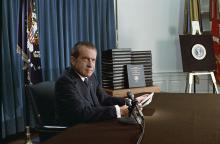
Rarely is racism confessed so baldly.
John Ehrlichman, domestic policy chief for Richard Nixon, admitted in 1994 that the "war on drugs" was a way to "criminalize" the ant-war left and black people, and "disrupt those communities," according to a recent article from Harper's Magazine.
Ehrlichman was known as a close adviser to Nixon, and served 18 months in prison for his role in the Watergate scandal.
Three protestors — two white, one Latina — were arrested March 19 for chaining themselves to cars and blocking traffic headed to a Donald Trump rally, reports .Mic.
Of the three, only one was transferred to Immigration and Customs Enforcement (ICE) to investigate her legal status. And guess which one it was.

Here’s my review of “America’s Original Sin: Racism, White Privilege, and the Bridge to a New America,” a new book by Jim Wallis: If you are a Christian, you should read this book.
Wallis, founder of Sojourners, a national faith-based organization that advocates for social justice, is a public theologian and the best-selling author of 12 books. He is white.
Rather than summarize his latest book, I am sharing some of my favorite passages. In Wallis’ own words:

Racism is being incited and condoned, and now violence is being incited and condoned. So we will need to bring what Archbishop Desmond Tutu once called “a spirituality of transformation.” I remember when he preached that message from the pulpit of the National Cathedral in Washington, D.C. I had the blessing of preaching from that same pulpit this past Sunday, and I wanted to share the sermon I preached with you.

Ian Haney Lopez articulated like no one else has why Sen. Bernie Sanders (I-Vt.) talking about race comes off as cold to my African-American ears. And his explanation highlighted for me not only how I believe Hillary Clinton gets it right, but also how discussions of race and “America’s Original Sin” of racism should be handled going forward.